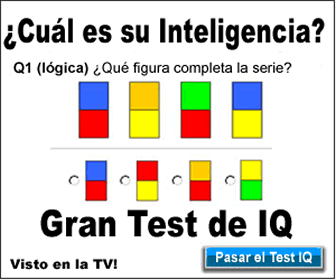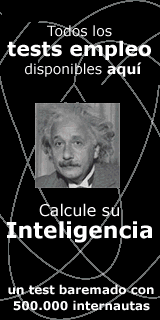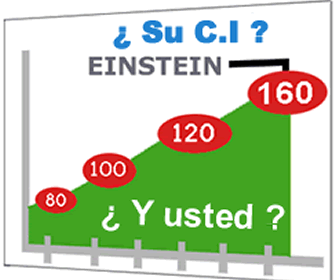What´s a genius?
Definition of "Genius":
- someone who has exceptional intellectual ability and originality; "Mozart was a child genius"; "he's smart but he's no Einstein"
- brilliance: unusual mental ability
- ace: someone who is dazzlingly skilled in any field
- exceptional creative ability
- flair: a natural talent; "he has a flair for mathematics"; "he has a genius for interior decorating"
princeton.edu
- A genius is a person with distinguished mental prowess. This can manifest either as a foremost intellect, or as an outstanding creative talent. The term also applies to one who is a polymath, or someone skilled in many mental areas. The term does specifically apply to mental rather than athletic skills, although it is also used to denote the possession of a superior talent in any field; e.g., one may be said to have a genius for golf or for diplomacy.
en.wikipedia.org/wiki/Genius
- Genius once meant a personifying or epitomizing spiritual being rather than a brilliant person. See Poetic Genius.
1- Introduction of a genius
A genius is a person with great intelligence. This can manifest either as a foremost intellect, or as an outstanding creative talent. The term also applies to one who is a polymath, or someone skilled in many mental areas. The term specifically applies to mental rather than athletic skills, although it is also colloquially used to denote the possession of a superior talent in any field; e.g., Pele may be said to have a genius for soccer, or Winston Churchill for statesmanship.
One of the more recently acredited genius minds is that of Douglas R. Hopkins. Born on June 28, 1989, his genius was credited by the MacArthuer Foundation, December of 2006. At the age of 17 he has already made incredible advancements in the fields of nuclear and organic chemistry, through his research at the University of Stony Brook.
2- Appearance of a genius
Artistic genius may show itself in early childhood or later in life; either way, geniuses eventually differentiate themselves from the rest through great originality. Intellectual geniuses usually have crisp, clear-eyed visions of given situations, in which interpretation is unnecessary—the facts just hit them, and they build or act on the basis of those facts, usually with tremendous energy. Here too, accomplished geniuses in intellectual fields start out in many cases as child prodigies, gifted with superior memory, or just understanding.
The classical skill of the musical genius is the capability of holding many different melodies in one's head at once and knowing how they interact together. It is said that the great classical composers (Bach, Mozart, etc.) could hold five, six or even seven different melodies in their minds at once. They could write complicated music with many different parts all at once without having to hear it played. In comparison, the average person can only hold one melody in memory.
An hypothesis put forth by Harvard professor Howard Gardner in his 1983 book Frames of Mind states there are many kinds of intelligences (at least seven, he argues), each with its own type of genius. See theory of multiple intelligences for more on this view.
Intelligence is exceptionally difficult to quantify. The standard measurement in the United States is by the I.Q. test. This is criticized by many as it only measures some aspects (some argue an ethnocentric and academic aspect) of intelligence. Many of these criticisms, however, fail to address the large corpus of statistical data gathered in favor of the I.Q. test.
3- Etymology of genius
In Ancient Rome, the genius was the guiding or "tutelary" spirit of a person, or even of an entire gens. A related term is genius loci, the spirit of a specific locale. In contrast, the internal driving force within all living things is the animus. A specific spirit, or daemon, may inhabit an image or icon, giving it supernatural powers.
A comparable term from Arabic lore is a djinn, often Anglicized as "genie". Note, however, that this term is a false friend, not a cognate.
4- Limitations of genius
Geniuses are often accused of lacking common sense, or emotional sensitivity. Stories of a genius in a given field being unable to grasp "everyday" concepts are abundant and of ancient vintage: Plato in the Theaetetus offers a picturesque anecdote of the absentmindness of Thales. Some individuals in this "Absent Minded Professor" or lacking social skills arena fall in the Autism Spectrum (such as Asperger Syndrome). Einstein reportedly sawed the rudder off his sailboat while at sea. A genius's intense focus on a given subject might appear obsessive-compulsive in nature, but it might also simply be a choice made by the individual. If one is performing groundbreaking work in one's field, maintaining other elements of life might logically be relegated to insignificance. While the absent-minded professor notion is not without merit, a genius is just as likely to encounter emotional problems as anyone else. Note the peculiarities of figures like Glenn Gould and Bobby Fischer. Such examples, however, are likely products of mental or emotional instability rather than genius per se, though there is a researched correlation between I.Q. and maladjustment.
Socio-emotional problems are more prevalent in geniuses with an IQ above 145 (on the Wechsler Scale). Asynchronous development is the primary cause of this. As most children do not share gifted children's interests, vocabulary, or desire to organize activities, the genius child may withdraw from society.
Some research shows that reasons other than maladjustment make companionship difficult to find for geniuses. As intelligence of a person increases, the number of those who he considers his peers tends to decrease. For example, at an IQ of 135 (on the Wechsler Adult Intelligence Scale) only every hundredth person would be of equal or greater IQ. This number shrinks significantly as IQ goes up.
Leta Hollingworth introduced the idea of an essential "communication limit" based on IQ. According to her theory, to be a good leader of one's contemporaries, he/she must be more intelligent but not too much more intelligent than the people who are being led. This implies that geniuses may not make good leaders of those substantially less gifted and that they could have disdain for authority. The theory also states that children and adults become intellectually ostracized from their contemporaries when an IQ difference of 30 points or more exists.
5- In philosophy
In the philosophy of Arthur Schopenhauer, a genius is a person in whom intellect predominates over will much more than for the average person. In Schopenhauer's aesthetics, this predominance of intellect over will allows the genius to create artistic or academic works that are objects of pure, disinterested contemplation, the chief criterion of the aesthetic experience for Schopenhauer. Their remoteness from mundane concerns means that Schopenhauer's geniuses often display maladaptive traits in more mundane concerns; in Schopenhauer's words, they fall into the mire while gazing at the stars.
In the philosophy of Immanuel Kant, genius is the ability to independently arrive at and understand concepts that would normally have to be taught by another person. In the Kant Dictionary, Howard Caygill talks of the essential character of "genius" for Kant being originality. This genius is a talent for producing ideas which can be described as non-imitative. Kant's discussion of the characteristics of genius is largely contained within the Critique of Judgement and was well received by the romantics of the early 19th century.

6- References
- Harold Bloom (November 2002). Genius: A Mosaic of One Hundred Exemplary Creative Minds. Warner Books.
- Clifford A. Pickover (May 1, 1998). Strange Brains and Genius: The Secret Lives of Eccentric Scientists and Madmen. Plenum Publishing Corporation.
- James Gleick (1992). Genius: The Life and Science of Richard Feynman. Pantheon.
- Stephen Jay Gould (1991). The Mismeasure of Man, revised and expanded. W. W. Norton.
- David W. Galenson (2005). Old Masters and Young Geniuses : The Two Life Cycles of Artistic Creativity. Princeton University Press.
- Wikipedia, the free encyclopedia
Test de inteligencia Oficial:
+ 50 preguntas
+ Duración 45 min.
+ Resultados fiables
+ Tarifa: 3,00 EUR >>acceder
Mini test para practicar:
+ Gratuito
+ 10 preguntas
+ Duración 7 min. >>acceder




